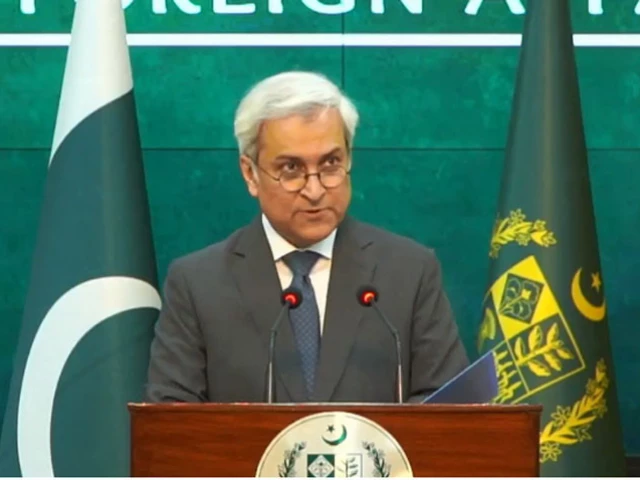Spokesman says national security and protection of Pakistani citizens is more important than any commercial activity
Spokesman for the Ministry of Foreign Affairs, Tahir Hussain Andrabi. PHOTO: Radio Pakistan
The State Department has clarified that Afghan transit trade remains closed and will remain closed until there is a significant improvement in the security situation along the Pakistan-Afghanistan border. At the weekly press briefing, FO spokesman Tahir Hussain Andrabi said the decision was prompted by recent armed attacks launched from across the border that claimed Pakistani lives.
“We feel for the difficulties faced by traders and businessmen. Common people are also affected due to non-availability of raw materials,” Andrabi said. “However, at the border points of Afghan transit trade, armed attacks were carried out against Pakistan, killing Pakistanis. This hurts us deeply. For us, the lives of Pakistanis are more important than any traded commodity.”
The spokesman emphasized that national security and the protection of Pakistani citizens are more important than any trade-related concerns. “We need to have a very clear priority on Afghan transit trade and our security. Pakistani lives and our security matter most,” he said.
Andrabi appreciated the constructive role of Qatar and Turkiye in mediating recent discussions between Pakistan and Afghanistan, describing them as a “first step towards ensuring regional peace and stability.” He said the talks focused on immediate measures to stop cross-border terrorism emanating from Afghanistan and to restore peace along the border.
The FO spokesman added that Pakistan looks forward to establishing a “concrete and verifiable monitoring mechanism” during the next round of talks scheduled to be hosted by Turkiye in Istanbul on October 25, 2025, aimed at curbing terrorist activities from Afghan soil.
“As a responsible state, committed to regional peace and stability, Pakistan does not seek escalation,” Andrabi said, urging the Afghan Taliban authorities to abide by their international obligations and take verifiable actions against terrorist groups, including TTP/FAK and BLA/FAH.
Pakistan condemns Israel’s annexation plan in the West Bank
FO also strongly condemned Israel’s attempt to expand its so-called “sovereignty” over parts of the occupied West Bank, including illegal Israeli settlements, through a draft law introduced in the Israeli legislature.
Andrabi termed the move a “flagrant violation of international law and UN resolutions”, reaffirming Pakistan’s unwavering support for the Palestinian cause. “We also reaffirm our unwavering support for the Palestinian cause, including the establishment of an independent, sovereign, viable and contiguous state of Palestine based on pre-1967 borders with Al-Quds Al-Sharif as its capital,” he said.
Pakistan reiterated its commitment to work with regional and international partners to uphold the right to self-determination of the Palestinian people and ensure peace, justice and dignity in the region.
During the briefing, Andrabi also shared details of Poland’s Deputy Prime Minister’s visit to Pakistan.
The Polish DPM expressed his country’s keen interest in expanding cooperation with Pakistan in various sectors and noted that Polish investments in Pakistan’s petrochemical industry currently exceed $500 million. He also suggested cooperation in water treatment technologies and praised Pakistan’s efforts to promote regional peace and stability.
The Polish Deputy Prime Minister called on Prime Minister Shehbaz Sharif, who highlighted the decades-long cordial relations between the two nations. The Prime Minister praised Poland’s industrial progress and expressed Pakistan’s desire to further strengthen cooperation in trade, energy, defense, education, labor and other areas of mutual interest.
Both sides also discussed regional and international developments, including peace efforts in the Middle East and Ukraine. The prime minister reiterated Pakistan’s position on peaceful resolution of disputes, including Kashmir, through dialogue, diplomacy and relevant UN resolutions, and reaffirmed Islamabad’s commitment to international law and humanitarian principles.



